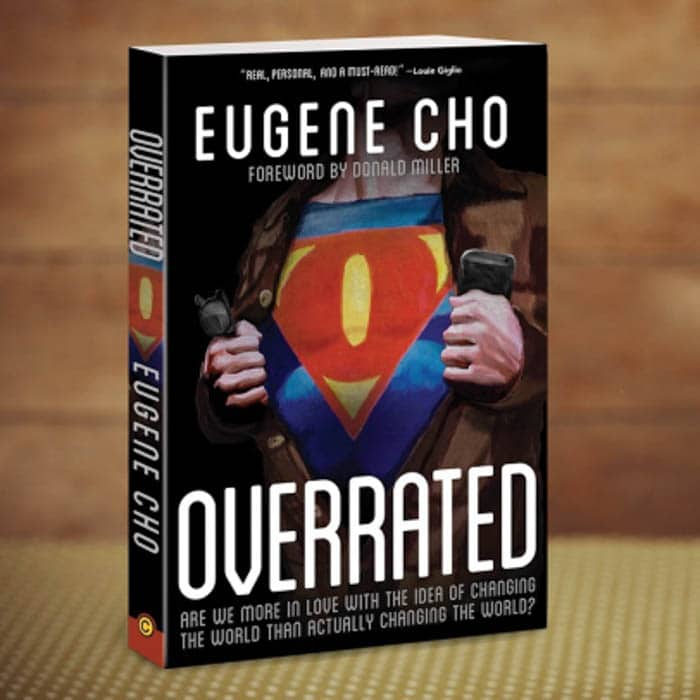The prophet Daniel was, as some might call it, an alpha male. He was handsome, fit, intelligent and wise. What’s more, God occasionally saw fit to speak through him and perform miracles on his behalf. He’s the kind of guy who, if he had a Twitter account today, would have millions of followers. Can’t you just picture handsome Daniel’s smiling face in a selfie with the sleeping lions, #blessed?
But over and over in the book of Daniel, we see that he had no interest in self-promotion—even to the point of turning down jewelry, robes and high positions (Daniel 5:17). His sole purpose was to bring honor and praise to the one true God, repeatedly pointing the Babylonian kings to Him.
Fast forward to present day. The satirical illustration on the back of Eugene Cho’s book Overrated perhaps says it all: An idealized Super Man-esque illustration of Cho holding the world in his hands while snapping a selfie of his chiseled heroics.

In an age when our private lives have become public lives and when fighting injustice and poverty has become trendy, Cho urges us to slow down and ask some difficult questions:
“If you want to change the world, then why, exactly, do you want to do that?”
Is it for your own selfishness? For your own greed? For your own happiness?
Much has been said about how this generation will be the one to change the world and right the wrongs of injustice. But, Cho warns, if our actions grow out of our instant self-gratification culture instead of a deep commitment to Christ and prayer, discernment and listening to God, our zeal will fizzle and we will become the most overrated generation.
Cho confesses that at the beginning of his own attempt to start a non-profit, he was “more enamored with the idea of changing the world and less enamored with actually doing it.” What he found is that the “actually doing it” was not that fun or glamorous of a process at all.
Although God wants to use us to change the world, He is also concerned with changing us. That is often a very painful process. It is the cost of discipleship. As Cho says,
“In seeking to do justice, we have to be open to the reality that God will challenge us, change us, and transform us.”
In Overrated, Cho, much like Daniel, continually points us back to God. If you are reading this blog, you already care about helping others.
In your concern for the poor, stay rooted in Christ. Spend time in self-examination asking yourself why you do what you do. Spend time—lots of time—in prayer before you begin a new work for God.
“Remember, we do what we do not for people’s applause but for God’s glory,” Cho reminds us.
As a step for all of us, why don’t we take some time to think through some questions (difficult questions)? Here are a few from the book and inspired by the book:
- What role do you believe simplicity has or can have in your life to weaken the power money has over you?
- Does your motivation to save children have more to do with you than the children?
- Is your motivation to be at the center of the story?
- What are you passionate about?
- How are you going deep to gain a broader understanding of what you’re passionate about?
- What steps can you take to ensure that you stay rooted in Christ as you seek to help people in poverty?
Let’s spend some time praying and reflecting on how God might be working in our own lives and how he might want to change and challenge our hearts!







3 Comments |Add a comment
Jesus, also a very devout Jew, taught from the mountaintop the heart of Judaism: giving, prayer and fasting.
He also stressed the secrecy of “acts of righteousness” that our act of righteousness must be performed in a secretive manner.
There was also a hotly debated issue among the rabbis and scholars regarding halacha and kavanah in His days and perhaps, He was very well aware of that.
Halacha is an outward act of righteousness and kavanah is one’s inner intentions or motives in Hebrew language.
In our act of giving and showing mercy to those deserving children, we must always pray: Thy kingdom come, not ours.
No matter how hard we try, how much loss we are willing to incur on behalf of the poor and despite our aspiration to become heroes to uphold their causes, we can never redeem the world because God never called us to finish the work of redemption, but to prepare the world for it.
I really appreciate the work of Mr.Cho because if the Christians are not sincerely concerned with social justice “in Jesus’ Name”, then who will?
I really wish I could do an act of righteousness through Compassion
“without letting my left hand know what my right hand is doing”.
Thank you, Amber, for the most needed reminder.
It was truly provocative for good.
Hi Amber.
We have a children s ministry in northern Alberta and would like more information on Compassion’s model partnering with the church. If you could point me in the right direction I would be grateful. My daughter is an advocate with you and has shared that Compassion partners with local churches to accomplish their goals and that won my respect for your organization. We work with the low income and assisted income families and would like to be more connected with the local church to do this. I realize that we are on a very small scale but how does a partnered church relationship with Compassion look.
Hi Kerry! I am so glad to hear that your daughter is an advocate with Compassion and that you are interested in knowing how we partner with the local church. Compassion church partnerships have flourished for many years and that is why we are committed to them.
Compassion’s decision to partner with local churches is a strategic one: We partner with the local churches in the countries where we work to provide finances, guidance and accountability in regard to the programs that Compassion provides. The local church body is the one who actually carries out Compassion’s program in the country. With few exceptions, Compassion-assisted projects are staffed and operated by people chosen from and responsible to a local church. Compassion believes that the local congregation is chosen by God to demonstrate His plan in the community. The local church is a catalyst for community change. For Compassion’s ministry purposes, the local church, together with parents, is responsible for a child’s Christian education. Partnership is the term we use to describe the relationship between Compassion and the local congregation centered on ministry to children. Partnership best represents the mutual respect, contribution, and common purpose in which children will be served best. Compassion contributes project management and design consultation. Compassion’s program facilitators provide assistance to the local partner by connecting them to a larger resource pool. This resource pool includes funding and knowledge. Compassion can help the local congregation approach and generate resources unknown to them.